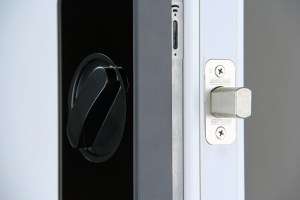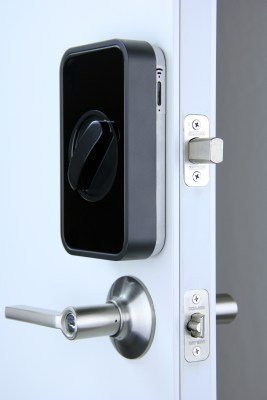Almost nine months after its crowdfunding success, the Lockitron is scheduled to ship on July 15th. As I learned through a chat with Apigy’s founder, it’s been a long road to this point as the young company overcame several obstacles including building $2.3 million in pre-orders without collecting any of the cash pledged by backers.
The company today announced a partnership with Schlage on a series of deadbolts specifically made for the Lockitron. Apigy’s co-founder Cameron Robertson explained to TechCrunch that this is in response to backer’s concerns that the Lockitron will not work with the lock on their door.
Apigy had several options to address this concern, which was especially prevalent in Europe where lock design very different from in the States. Cameron explained that they could have gone with an inexpensive deadbolt, allowing them to offer it for less. Instead Apigy partnered with Schlage, a very well-known and respected Ingersoll Rand lock brand.
This deadbolt features a design that’s better suited for use in home automation tasks. The end is tapered, allowing the deadbolt to more reliably lock — a pretty important consideration since the Lockitron is designed to be used remotely.
Backers will have the option of adding this deadbolt replacement to their Lockitron order for $30.
 In a chat earlier this week Robertson detailed to me the pains his company has experienced since announcing this version of the Lockitron.
In a chat earlier this week Robertson detailed to me the pains his company has experienced since announcing this version of the Lockitron.
The company had a rough time from the start, getting rejected from Kickstarter that forced them to crowdsource their production funds themselves. This method allowed the company to treat their backers with a bit more respect. Instead of collecting cash after the crowdfunding campaign concluded, like Kickstarter, Apigy stated they wouldn’t force backers to pay until the Lockitron ships.
The crowdfunding campaign was a huge success. The company surpassed its $150,000 goal within 24 hours, and over the next five days collected $1.5 million in Lockitron pledges. And since they promised to not collect any money until shipping, this huge chunk of potential cash caused a bit of an issue.
To resolve it, Apigy turned to angel investors to get the capital needed to build and ship these devices. They essentially built their device on credit instead of a pot of Kickstarter money.
The company won’t reveal any specific order numbers, but they have been taking reservations since concluding their crowdfunding campaign last October. As of today, Lockitron.com lists 14,704 reservations totaling $2,278,891.
The first batch will ship to backers on July 15. Reservations are still open, so anyone can still get one for $179.
Apigy got a lot of things right with the Lockitron. This was their second go at a remote locking device. The company graduated from Y Combinator’s summer 2009 class with a device that promised similar remote access but at twice the price. They went back to the drawing board.
This generation of the Lockitron is much more sophisticated and available for under $200. Best of all, it works on most deadbolts — and if it doesn’t work on yours, Apigy now has the aforementioned replacement.
Apigy has a winner with the Lockitron. Cameron demoed the unit at our CES booth last January and it works as advertised. Excuse the pun, but it’s a clever, turn-key solution that brings simple home automation to the masses.
The company shouldn’t have a problem finding buyers for the Lockitron. But who is going to buy Apigy? That was my question to founder Cameron Robertson. The company, with its rockstar founders and products, is ripe for acquisition.
He laughed but then paused.
“We’re not for sale,” he stated frankly. Apigy has big plans for the Lockitron, explaining that they built its platform to continually evolve. They want to see it through.
So, essentially, Apigy is not for sale yet.
